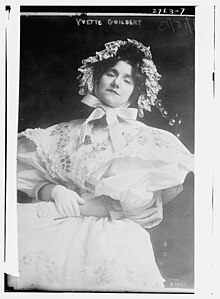Yvette Guilbert
| Yvette Guilbert | |
|---|---|

Yvette Guilbert in 1913
|
|
| Born |
Emma Laure Esther Guilbert 20 January 1865 Paris, France |
| Died | 3 February 1944 (aged 79) |
| Resting place | Père Lachaise Cemetery |
| Occupation | Cabaret singer, actress on stage and in silent films |
| Known for | Belle Époque diseuse, innovator of the French chanson, subject of portraits by Henri de Toulouse-Lautrec |
| Awards | Awarded the Legion of Honor as the Ambassadress of French Song, 9 July 1932 |
Yvette Guilbert (French pronunciation: [ivɛt gilbɛʁ]; 20 January 1865 in Paris – 3 February 1944 in Aix-en-Provence) was a French cabaret singer and actress of the Belle Époque.
Born into a poor family as Emma Laure Esther Guilbert, Guilbert began singing as a child but at age sixteen worked as a model at the Printemps department store in Paris. She was discovered by a journalist. She took voice and acting lessons on the side that by 1886 led to appearances on stage at smaller venues. Guilbert debuted at the Variette Theatre in 1888. She eventually sang at the popular Eldorado club, then at the Jardin de Paris before headlining in Montmartre at the Moulin Rouge in 1890. The English painter William Rothenstein described this performance in his first volume of memoirs:
"One evening Lautrec came up to the rue Ravignan to tell us about a new singer, a friend of Xanrof, who was to appear at the Moulin Rouge for the first time... We went; a young girl appeared, of virginal aspect, slender, pale, without rouge. Her songs were not virginal – on the contrary; but the frequenters of the Moulin were not easily frightened; they stared bewildered at this novel association of innocence with Xanrof's horrific double entente; stared, stayed and broke into delighted applause."
For her act, she was usually dressed in bright yellow with long black gloves and stood almost perfectly still, gesturing with her long arms as she sang. An innovator, she favored monologue-like "patter songs" (as they came to be called) and was often billed as a "diseuse" or "sayer." The lyrics (some of them her own) were raunchy; their subjects were tragedy, lost love, and the Parisian poverty from which she had come. During the 1890s she appeared regularly alongside another star of the time, Kam-Hill, often singing songs by Tarride. Taking her cue from the new cabaret performances, Guilbert broke and rewrote all the rules of music-hall with her lyrics, and the audiences loved her. She was noted in France, England, and the United States at the beginning of the twentieth century for her songs and imitations of the common people of France.
...
Wikipedia
